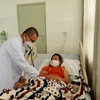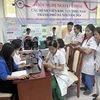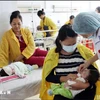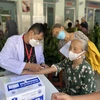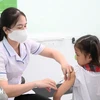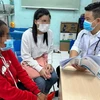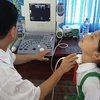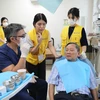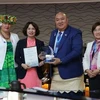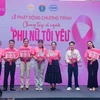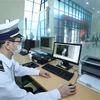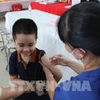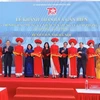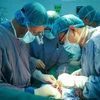Da Nang (VNA) – The Breast Milk Bank under the Da Nang Hospital for Women and Children, the first of its kind in Vietnam, received 140 litres of milk donated by 46 nursing mothers, including 60 litres used for 136 infants with high risks of malnutrition or infections, after two months of operation.
According to Nguyen Duc Vinh, head of the Ministry of Health’s Department for Maternal and Child Health, the bank has proved its initial efficiency by saving many children facing high risks of fatality in Da Nang city as well as the central and Central Highlands regions.
This is a good reason for the ministry to consider expanding the model to other health care facilities nationwide, he stated.
Vinh expressed hope that State agencies and international organizations continue providing support in finance and personnel training as well as health equipment for the duplication of human milk banks, thus meeting people’s demand in the field.
Meanwhile, Mona Byrkit, Mekong regional director of PATH, a US-based international nonprofit organization on health care, pledged that the organization will continue assisting Vietnam in finance and personnel training as well as special equipment for the bank in the hope of providing safe and nutritious human milk to infants.
Doctor Tran Thi Hoang, Vice Director of the Da Nang Hospital for Women and Children, noted that as many as 30 percent of 13,000-15,000 infants born at the hospital each year encounter risks of malnutrition or infections.
Therefore, the breast milk bank is designed to provide human milk for the caring and treatment of about 3,000-4,000 infants each year, said Hoang who revealed that in order to supply safe milk to the needy, both health staff and donors must strictly follow donation procedures.
In the coming time, the hospital will enhance communications to encourage nursing mothers to donate their milk, thus benefiting infants in Da Nang as well as the central and Central Highlands regions, she added.
Vietnam’s first Breast Milk Bank is sponsored by the Margaret A. Cargill Philanthropies and Bill & Melinda Gates Foundation, with technical support from a number of non-governmental organizations that provide training courses to health care staff as well as assistance in equipment and communications.-VNA
According to Nguyen Duc Vinh, head of the Ministry of Health’s Department for Maternal and Child Health, the bank has proved its initial efficiency by saving many children facing high risks of fatality in Da Nang city as well as the central and Central Highlands regions.
This is a good reason for the ministry to consider expanding the model to other health care facilities nationwide, he stated.
Vinh expressed hope that State agencies and international organizations continue providing support in finance and personnel training as well as health equipment for the duplication of human milk banks, thus meeting people’s demand in the field.
Meanwhile, Mona Byrkit, Mekong regional director of PATH, a US-based international nonprofit organization on health care, pledged that the organization will continue assisting Vietnam in finance and personnel training as well as special equipment for the bank in the hope of providing safe and nutritious human milk to infants.
Doctor Tran Thi Hoang, Vice Director of the Da Nang Hospital for Women and Children, noted that as many as 30 percent of 13,000-15,000 infants born at the hospital each year encounter risks of malnutrition or infections.
Therefore, the breast milk bank is designed to provide human milk for the caring and treatment of about 3,000-4,000 infants each year, said Hoang who revealed that in order to supply safe milk to the needy, both health staff and donors must strictly follow donation procedures.
In the coming time, the hospital will enhance communications to encourage nursing mothers to donate their milk, thus benefiting infants in Da Nang as well as the central and Central Highlands regions, she added.
Vietnam’s first Breast Milk Bank is sponsored by the Margaret A. Cargill Philanthropies and Bill & Melinda Gates Foundation, with technical support from a number of non-governmental organizations that provide training courses to health care staff as well as assistance in equipment and communications.-VNA
VNA



